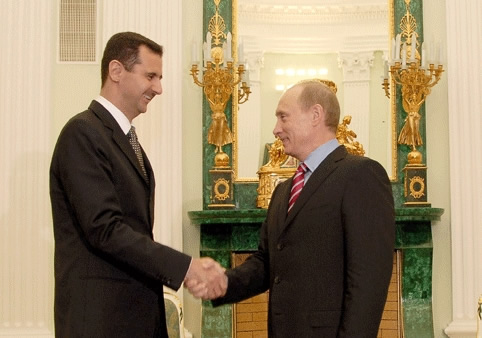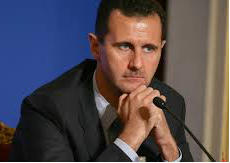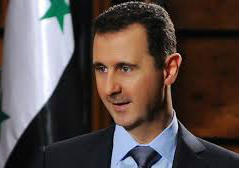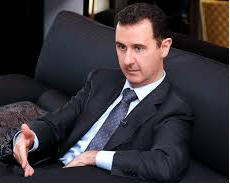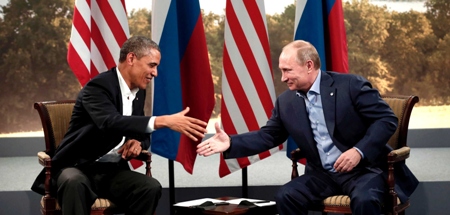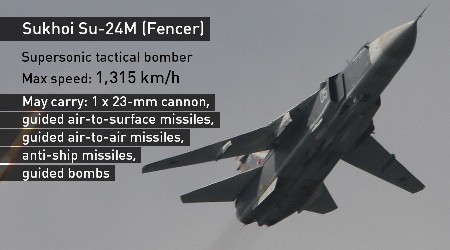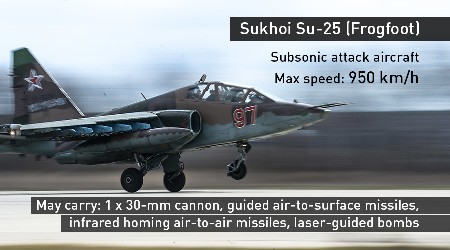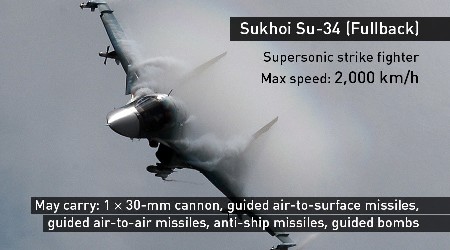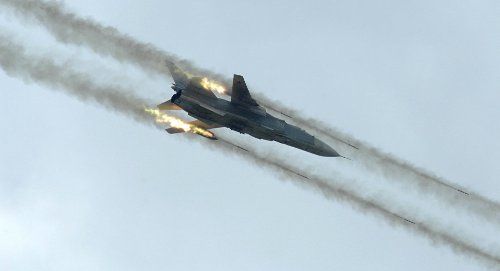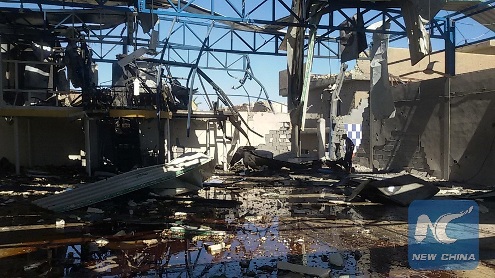Introduction Russia’s decision to enter the war against the Islamic State and other terrorists in Syria on October 1 was the culmination of the growing threat against its integrity and independence. Really, this has been building ever since NATO violated its commitment not to expand East during negotiations for the reunification of Germany. Russia’s decision to defend Syria from Western aggression has also been an extremely well-planned response to the tearing apart of Syria on Russia’s border over the last 5-7 years by foreign terrorists. First, let’s place the current war on Syria in it’s historical context: Syria: From Colonization to a Democratic Secular State Stepping away from the canvas for a broader look we see that Syria has been targeted by the West since the end of WWI, beginning with the British-Arab assault in October, 1918, followed by the San Remo conference in 1920 when Syria and Palestine were placed under French and British control respectively. In 1920, the French assaulted and occupied Damascus, possibly the oldest continuously inhabited city in the world. In 1922, the French broke Syria up into 3 parts which remained until World War II when Germany defeated France. But its troops returned to occupy Syria again with the British military in 1941. It wasn’t until 1946 that the last French troops left Syria and for the next 25 years the country was subjected to internal struggles under Arab rulers as a member of the United Arab Republic. In 1971, when Hafez al-Assad was elected president for a 7 year term, Assad dropped the constitutional requirement that Syria’s president must be a Muslim, creating the secular state that we see today. In 2000, Assad died and Syrians elected his son, Bashar Hafez al-Assad as their president to two successive 7 year terms in 2000 and 2007. In 2014, among a field of other presidential candidates, Syrians elected Assad president again for his third term in office. The EU and US then began in earnest their war-by-proxy in Syria, leading up to the country being ripped apart for the last 5 years by the Islamic State and other foreign terrorists who have been supported by the US, Israel, Turkey and their Arab clients, Saudi Arabia among others. Five years of the west’s demands for “regime change” failed and Russian President Vladimir Putin initiated aerial attacks on the terrorists, supporting the Syrian army upon President Assad’s request for help. Timeline
For years we have held that the imperialists have responded to the dangers of the internet by flooding it with terminology and conflicting stories, even within their own news and opinion reports. Intentional confusion is a tactical weapon used in the media war, persuading the public that nothing can be believed. The terms Islamic State (IS), ISIS, ISIL, Al Nusra, Al Queda, rebels, ‘moderate’ rebels, Islamic extremists, mercenaries and terrorists are mixed and matched by the western media to suit their latest fabrications. The names for them in the western media are enough to make our heads spin and the average person who lacks the time or interest quickly loses track of who’s who in the West’s view of the world of terrorism. In this report, we consider all those who carry out violent attacks on the Syrian government as terrorists but we’ll adopt the commonly used names, "Terrorist" and "Islamic State” which the latter in fact, is a subterfuge that falsely links the terrorists to Muslims and the Religion of Islam. President Bashar al-Assad
"Western countries are using terrorism as an instrument of control"
President Assad thinks that the US-led coalition against Islamic State (IS, formerly ISIS/ISIL) is ineffective because the West does not want to defeat terrorist groups. In fact, it wants to preserve the balance between the warring sides to “perpetuate the process of erosion in Syria and Iraq and, later, other countries of the region, so that we all remain weak for decades and maybe generations.”
Prelude to a Military Campaign During the West’s most recent aggression against Russia’s neighbors, Putin patiently waited, studied their movements, and prepared a systematic response that included sequential steps which led to Russia’s military action during the last 7 days and continuing. Here we take a look at President Putin’s diplomatic process leading up to the current military campaign. 8 Sequential Actions to an Effective Battle 1. Right Action The first thing the trained eye sees in Vladimir Putin’s strategy is the influence of Eastern philosophy. One important quality that sets it apart from western strategies and tactics is his patience – his ability to wait and observe - before arriving at the right time to take concrete action. From Eastern Philosophy we learn that sometimes the most effective action is “no action,” or “action in mindfulness” also known as “right action.” During times of “right action” the need for overt action sometimes evaporates and other times leads to timely praxis. In the case of Ukraine and Syria, patience and waiting paid off for Putin as the bizarre schemes of arming & funding terrorists in Syria finally ground down to an embarrassing and bloody failure with the CIA losing control of it’s mercenaries as they defected to the groups that Washington was pretending to fight. Putin is also master of martial arts and has learned the related philosophy of Jujitsu, the skill of manipulating the opponent's force against himself rather than confronting it with his own. The US and their allies fighting against Syria fell under their own weight. 2. Diplomacy President Putin Paves the Way with Foreign Countries: In New York on September 4, President Putin spoke to the UN General Assembly of the need for an international coalition to fight terrorism:
Putin's Travels: During the last 8 months, Putin has laid groundwork to build that “international coalition” by extending his diplomacy in visits to at least 20 foreign officials and heads of state in Egypt, Ukraine, France, Germany, Hungary, Armenia, Italy (Milan, Rome, and Vatican City), Azerbaijan, Belarus, Turkey, China, Tajikistan, and the United States. In November, he plans to visit Turkey for the G-20 Leader’s Meeting and to the Philippines for the APEC Economic Leaders’ Meeting. In 2014, Putin visited more than 60 foreign officials and heads of state in their countries. During the last 20 months of travel, he repaired relationships, cemented trade deals, and prepared foreign leaders for Russia’s military action in Syria that began 7 days ago. Putin's Visitors: During the same period of time, foreign officials and Heads of State beat a path to Putin’s door from more than 30 countries, many US allies or client states, among them Saudi Arabia, Egypt, Jordan, Abu Dhabi (AEU), Japan, Germany, Spain, Italy, Greece, France, Israel, Palestine, United States, and China. 3. Legitimacy It’s commonly known that President Putin has opposed the US policy of “regime change” and in principle he has consistently stood by Bashar al-Assad as the legitimate president of Syria while the West vilified Assad and demanded his removal. Putin consistently declared that foreign intervention in any sovereign state violates international law according to the Geneva Convention and UN Charter. While his Syrian friends bled, he stated that Russia would only intervene if invited to do so by the legitimate Syrian government, sending a signal to Syria. President Assad secretly responded by asking Russia for support in its war against the terrorists. John Laughland, Director of Studies, Institute of Democracy and Cooperation (IDC) in Paris indicated that the key difference between the Russian and Western campaigns in Syria is that Moscow officially has been askedfor help by Damascus, unlike the US who “neither waited for the Syrian government to ask for help, nor had a mandate from the UN.” Below we shall see how public confirmation of Assad’s secret letter of invitation to Putin triggered action that moved forward at warp speed. 4. President Putin's Address at the United Nations
In his speech before the UN General Assembly, President Putin spoke of international law, state sovereignty, instigated coups, anarchy, terrorism, restoring statehood where it's been destroyed, the Cold War mentality, economic cooperation; unilaterally imposed sanctions circumventing the UN Charter, used to eliminate market competition; the rise of economic selfishness, the imposition of "new game rules, deliberately tailored to accommodate the interests of a privileged few," the task of creating an equal and indivisible security environment that would not serve a privileged few, but everyone." We encourage everyone to read Putin's entire speech and watch the video of his address. But here we provide excerpts that pertain to our topic, Russia's military action during the last 7 days.
5. Putin Meets Obama
Russia and the United States agreed on Monday to look for a diplomatic end to the Syrian civil war. But Obama continues the demand of his masters that Syrian President Bashar al-Assad be "removed" as part of any international effort to destroy the terrorists. President Putin has adamantly rejected this in his calls for sovereignty and democracy, arguing that only the Syrian people have a right to remove their president if they desire. During a 90-minute meeting with the US president, Obama bent the knee and agreed that US and Russian military commanders should hold talks to avoid coming into direct conflict in Syria. But the two maintained their positions regarding President Assad: the US demanding that Assad step down after reviling and demonizing him over the last several years; and Russia's logic in defense of national sovereignty that only the Syrian people have the right to depose their president. 6. Assad makes his invitation public Last Wednesday night, Syria confirmed that its government had previously sent a letter to President Putin, asking for military assistance in fighting the terrorists. In Damascus, a military source welcomed the development as “positive”, saying Russia's support is,
From the moment that Assad confirmed his request, late Wednesday night, to President Putin, things moved ahead at warp speed. 7. The Upper House of Russian Parliament votes Within an hour or so of Assad’s confirmation of the letter, Russia's upper house of parliament voted unanimously to approve Russian air support to the Syrian military fighting the terrorists. 8. Russia Attacks IS Immediately following the parliamentary vote, at 2 a.m. GMT. October 1, two Russian airstrikes hit a training camp run by Syrian rebels who had received US military training. The US has been calling them “the moderate opposition,” trying to link them to the original Syrian protests who were co-opted by the US. It's the same strategy the US used to exploit the original Maiden protesters in November 2013 to overthrow the elected government in Ukraine. In Syria, by hitting the US-backed terrorists first, Putin threw down the gauntlet, sending a message to the US and Europe that Russia makes no such distinction among the terrorists in Syria. On Thursday, the Russian Air Force went on to attack 8 terrorist encampments, weapons depots, and infrastructure. Prior to the attacks, Russia had not revealed details of its forces in Syria but now the world knows. RT News reports that the Russian Air Force in Syria includes over 50 warplanes, helicopter gunships, Russia's Su-24M armed with laser guided missiles and bombs, Su-25 ground attack planes and their Sukhoi SU-34 Supersonic Strike Fighter. Russia has long range striking ability with its Su-24M2 Fencer jets which it sent to its newly opened base at Latakia, Syria. They are armed “with guided weapons, including 500 and 1,500kg laser-guided bombs and TV-guided bombs, and laser/TV-guided missiles Kh-25 and Kh-29L/T, anti-radar missiles Kh-58 and Kh-14 (AS-12 'Kegler') and Kh-59 (AS-13 'Kingbolt')/Kh-59M TV-target seeker guided missiles". Upgrades to all these systems are being used in Syria.
The First 6 Days
Thursday, October 1: On Thursday, Igor Konashenkov, a spokesperson for the Russian Defense Ministry, explained how Russia was able to launch its planes so quickly after President Assad's request to Vladimir Putin and the vote in the Russian parliament last night:
Konashenkov described the first attacks on some of the terrorist facilities:
According to RT News, Russia selects and coordinates the targets for its airstrikes with the Syrian military. Dmitry Peskov, spokesman for President Putin told the media. “We have a list of terrorist organizations. We know them.” He added that it was too early for a complete assessment but that the aerial campaign against terrorism will continue in Syria until “the end of the offensive operation of the Syrian army.” So it appears that Russia is in this fight for the long haul. Following the initial attacks on Thursday, a Syrian presidential aide praised Russian air support against the terrorists and blasted the West’s “ineffective” airstrikes which resulted in strengthening rather than degrading multiple terrorist organizations in Syria. Thursday – Saturday, Sept 30 - Oct 3: In the first 4 days, Wednesday night/Thursday morning - Saturday, the Russian Air force conducted more than 60 flights and bombed over 50 terrorist targets. On Saturday, Lieutenant General Andrey Kartapolov, head of the Main Operation Directorate of the General Staff of Russia’s armed forces, told reporters:
Kartapolov added, that the terrorists are fleeing the areas they had controlled, “There is panic and defection among them. About 600 mercenaries have left their positions and are trying to reach Europe.” A more recent report from the Defense Ministry indicated that an estimated 3,000 terrorists were seen fleeing Syria, fighting with the Islamic State who was treating them as deserters. Sunday, Oct 4: On Sunday, RT reported the attack from information received from the Russian Defense Ministry:
Monday, Oct 5: Defense Ministry Spokesman reported that the Russian Air Force conducted 15 sorties on IS installations in the last 24 hours, eliminating “disguised terrorist bases, some equipped with T-55 Tanks, artillery, a field munitions depot, a Command Center and Communications Hub." Sukhoi jets struck 10 IS targets in various regions. 20 tanks and 3 multiple rocket launchers in Homs province near embattled Palmyra were destroyed. The Defense Ministry released a video released which showed a strike against an IS ammunition depot in Homs: “Bright flashes confirm detonation of munitions caused by direct hits of air bombs. Thick smoke provides evidence of fire in the depot.” Also, some 30 IS military vehicles including tanks were destroyed in the forested area near the city of Idlib in northwest Syria, according to the ministry: “We have irrefutable intelligence, including [intercepted] communications between the militants in the area, [proving] the destruction and damage of the terrorists’ armored vehicles.” Tuesday, Oct 6: Russian jets hit 12 Islamic State targets in the course of nearly 20 combat flights carried out in Syria on Tuesday, according to the Defense Ministry. Command centers and training camps were destroyed in the attacks which threw the extremists into panic. Defense Ministry spokesman Igor Konashenkov stated that at the time of this Axis of Logic report, "Su-34, Su-24M and Su-25 have launched air strikes on 12 objects of logistic infrastructure, command posts, training camps and facilities of militants belonging to terrorist groups allied with Islamic State [IS, formerly ISIS/ISIL],” The Defense Ministry reported the Russian jets destroyed an Islamic State army munitions plant outside Damascus as well as two command centers in Deir ez-Zor, according to the ministry’s statement. In the Idlib Governorate, a training camp for IS militants was eliminated, while several IS strongholds came under attack where ammunition depots were blown up. The Ministry also published a fresh video said to show extremists positioning their hardware near a mosque. Konashenkov reported that Russia’s targeted airstrikes have caused “panic” among the militants, also stressing that the attacks are not conducted in residential areas or places containing landmarks. RT News reported that Hmeymim airbase has been used by the Russian Air Force since Moscow launched its anti-IS operation last Wednesday, following a request from Syria’s President Bashar al-Assad. As I indicated previously, the Russian combat unit is comprised of over 50 aircraft including gunship helicopters and space surveillance equipment and drones.
The Russian Defense Ministry published the following video on YouTube and Twitter showing the first images of today's naval attack.
Media Reports Civilian Casualties Allegations of civilian casualties quickly became the centerpiece in the media war and the US media machine was well prepared - too well prepared. President Putin pointed out that media reports of civilian casualties began even before Russian warplanes were first launched for their first combat mission and Putin described them as 'information attacks':
RT News reports on how social media is used to spread anti-Russian propaganda:
Presidential spokesman Dmitry Peskov asked news organizations and the public to carefully confirm all information related to Syria, "because there was plenty of biased, distorted or patently false information coming from the region." The targets bombed and attacked this week were distant from civilian populations. This is confirmed by testimony on location and aerial videos we have read and watched. Footage, for example, released by the Russian Ministry of Defense shows airstrikes on the terrorist infrastructures with no local civilian populations. Russia’s Lieutenant General Andrey Kartapolov reported that Washington notified the Russian Defense Ministry that there were “only militants” in the areas where Russian forces were operating. "The Americans informed us during contacts that there was no one except terrorists in this region." John Laughland, (IDC in Paris) explained US “tacit support” for the Russian operation is a major change to its previous stance, and the reason is that:
The difference between the Western deployment of troops and the Russian aerial attacks is that Moscow’s decision is being “conducted in cooperation with the Syrian army.” Laughland added,
The Destruction The Human Toll: The Migration Policy Centre, based at the European University Institute, carried out a study of Syrian refugees through local researchers in 2012, updated in 2014. Here, the MPC reports the most recent findings on the "worst refugee crisis in years:
As of August, 2015, The Syrian Observatory for Human Rights reported nearly a quarter million deaths have been documented (240,381). Among 71,781 civilian deaths are 11,964 children. The group also reported the deaths of 50,570 Syrian government soldiers. In addition, 77,759 terrorists have been killed including what they call 43,384 "rebels" and 34,375 foreign fighters. The number of injuries is unknown and the degree of suffering by the Syrian people of course is inestimable. The destruction that has been wrought is massive. The human toll is truly immeasurable and broken families of the victims will require generations to grieve losses of children, husbands and wives, grandparents, uncles and aunts, cousins and loved ones and eventually to find stability and inner peace in their lives again. The deaths or flight of some of Syria's many educated people - professionals in education, medicine, law, engineering and social work - will create a void that will take time to fill. The repatriation of the refugees who decide to return will also involve an enormous effort on the part of the government, with the help of Syria's allies. Reparations by the invaders and those who have backed them would certainly be in order but western countries have never been known to apologize for any of their war crimes and pay debts to the people they've victimized. The infrastructure: It will take time after the war is over to assess the destruction of homes, schools, farmlands, water supplies and food distribution systems, roads, bridges, health care facilities, government buildings, manufacturing and the oil industry not to speak of the years and enormous funding, work, and organization to rebuild Syria. Here are a few examples of the damage done:
The latest assessment we could find on Syria's health care system reported that half of Syria's hospitals had already been destroyed by 2013. At that time, Lancet (the British medical journal) published an open letter submitted by international aid agencies stating: "Systematic assaults on medical professionals, facilities and patients are breaking Syria's health-care system and making it nearly impossible for civilians to receive essential medical services." Oil Pipelines and Refineries: September, 2014 the LA times reported: "Making the first major push to choke off financing for Islamic State, U.S. and allied Arab warplanes bombed a dozen small oil refineries in eastern Syria on Wednesday that U.S. officials said were part of a $2 million-a-day revenue stream for the Sunni Muslim extremist group.” Maram Susli, known in the media as "Syrian Girl," responded:
Illusions of World Dominance: The fourth reason that I think the future of Syria cannot be predicted at this time is the willful, morally bankrupt and ignorant (add your own adjectives), hell-bent mentality in Washington that lives in the cloud of illusion that they can eventually gain "full spectrum dominance" of the entire world - by force. Do you really believe that eyeball-to-eyeball with Putin and the prospect of full scale nuclear war, the chicken-hawks, cowards with big mouths, in Washington are going to go for it? They haven't in the last 7 days now have they.Conclusion: Writing as a psychologist (my profession for 30 years) they are psychopaths or more accurately, sociopaths. But most sociopaths are not suicidal.The 5 year US/European "globalization" war in Syria, has been carried out through a cunning, deceptive scheme, creating religious sectarianism through false flag operations, sowing hatred, arming and funding thousands of terrorists and mercenaries moving into Syria from around the world to gain control. Walt Peretto, writing from Washington DC, described this mental disorder well:
Finally, it is very important to remember that President Putin is not a rogue dictator, acting with his own private army as the media often tries to portray him. First and foremost, he enjoys the overwhelming support of the Russian people, his political party and the Russian Parliament. He is also backed by members of the Russian Federation, China, Iran, Venezuela and other Latin American countries. Russia has membership in BRICS, important current or pending trade agreements with India, Asian countries and some European countries dependent on Russian gas and oil and their technology and food exports to Russia. The current sanctions have been a two-edged sword for those who've imposed them. Putin has orchestrated his response to the US/EU spawned coup in Ukraine and now to the aggression in Syria with extreme care and within the constraints of international law. His response is being measured against the folly and failure of US interventions and wars over the last 15 years. His timing of these first attacks on terrorist strongholds has been near perfect. He acted immediately following his speech at the UN, the vote of the Russian Parliament, Assad's request for assistance and following the US admission that their militarism in Syria has failed. It's difficult to imagine that the US or NATO would dare to engage Russia militarily inside Syria, directly or otherwise. Washington been boxed in by its own folly and has at least tacitly conceded their embarrassing defeat in Syria. The US and Israel won’t be so easily persuaded and will use all the economic muscle and military power they have to bend their client states, from Australia to Germany, into compliance with their policies for world domination. So it's barely conceivable to think that Obama will agree in good faith to Putin's request to join in an international coalition against terrorism. However, it appears that European countries are beginning to see the intelligence in Putin’s proposal for an international coalition to fight terrorism. Considering the trade and economic benefits Russia has to offer some European countries, there may be some with enough sense to break from US foreign policy and cooperate at some level. It's only been 7 days since Russia has taken this historic step; but President Putin is a man not known to back down after he's placed his ducks in a row and followed through with his commitments as he has with Syria and President Assad. Sources Sputnik, CNN, Fox, RT News, Xinhua, Asia Times, Reuters, Al Monitor, Business Insider, Daily Mail, CNBC, Russia Behind The Headlines (RBTH), Jacobin Mag, The Guardian, The Independent, BBC, Al Monitor, Daily Mail, Der Spiegle. A special thanks to my accomplished co-editor, Paul Richard Harris who did his magic with a final edit of this report. - lmb Biography,
Essays and Poetry by Les Blough © Copyright 2015 by AxisofLogic.com This material is available for republication as long as reprints include verbatim copy of the article in its entirety, respecting its integrity. Reprints must cite the author and Axis of Logic as the original source including a "live link" to the article. Thank you! |
